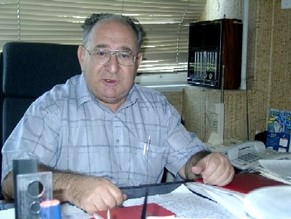|
World Jewish News

Member of the General Council of the EAJC Boris Shapiro(photo by aen.ru)
|
Kyrgyzstan Jews pitching in to help violence-torn region
16.06.2010, Jews and Society The Jewish community of Bishkek is helping to deliver humanitarian aid to the south of Kyrgyzstan for those who are caught up in the ethnic rioting taking place there.
"We have raised money to buy 30 sacks of flour and 15 sacks of rice," the head of the Bishkek Jewish community, member of the General Council of the Euro-Asian Jewish Congress Boris Shapiro, told JTA this week.
"The assembly of the Peoples of Kyrgyzstan, in which our community takes part, is sending a truck with these and other sacks of food to the Fergana Valley. This aid is meant not only for Jews but for all the people suffering there."
Ethnic rioting in the country's south between ethnic Kyrgyz and Uzbeks has led to the death of at least 170 people and 1,800 injuries, according to reports, though the death toll could be much higher. In addition, at least 100,000 people have been displaced.
About 70 Jews live in four cities in the conflict area, mostly pensioners living alone.
The American Jewish Joint Distribution Committee says it has expanded its services -- including providing extra food and medicine -- to the region's Jews and continues its daily monitoring of their safety.
The head of the Bishkek Chesed center, Alla Volkovich, keeps in constant contact with 20 families in the south by telephone.
Volkovich says they are safe enough, though most are afraid to leave their homes. No anti-Semitic incidents have been reported since the beginning of the conflict.
No Jews from the Fergana Valley have tried to escape from the conflict zone, Volkovich says, "and now it's practically impossible."
"The border with Uzbekistan is closed, and Bishkek is 600 kilometers [about 375 miles] away. This is too far, and a dangerous road."
Hopefully the violence has peaked, Shapiro said.
"I witnessed a very similar conflict in the same area 20 years ago, when I was deputy minister of public health," he recalled. "As far as I can see, the situation is more or less under control by now."
Upheaval in Kyrgyzstan in April resulted in a new government, bringing anxiety to the 1,500-member Jewish community. The protests were accompanied by an attack on the Bishkek synagogue and the appearance of an anti-Semitic banner near the presidential palace. It was ordered to be removed by the head of the provisional government, Rosa Otunbaeva.
JDC's long-term support for the Jewish community in Kyrgyzstan, an estimated 1,300 people, includes the local Chesed welfare center in Bishkek, which provides food, medicine and home care to the community. Additionally, JDC supports a Jewish library, a program for family education, as well as other aid and Jewish renewal programs for elderly and children at risk.
JTA
|
|
